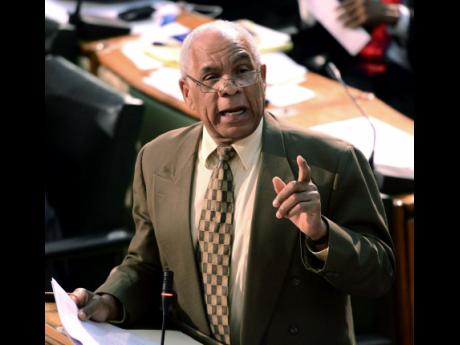Light On Corruption | Until Jamaicans start demanding change, it will continue to be business as usual
Corruption is defined as the abuse of entrusted power for private gain. The issue of corruption is not new; it is probably as old as the State or any political organisation with the prerogative to allocate resources. The ethical failings associated with corruption are indisputable. Yet the ambiguities about corruption, its causes, its effects and its cures cause many to wonder whether fighting it has been a true priority or merely a rhetorical one. Not in dispute, however, is the fact that fighting corruption has seemingly become a rhetorical priority.
Jamaica is consistently ranked as highly corrupt by Transparency International. The Corruption Perception Index (CPI) of 2016, calculated using composite indexes spanning a two-year period, saw Jamaica slipping 14 points as it relates to the country's rank in comparison to other states. But, very few pay attention to the actual CPI Score - this is more telling, in that, even though the country will see incremental change as it pertains to its rank, the score which determines the perception of corruption has largely remained the same - within the range of 35 to 42 since the index was created in 1995. In essence, the indexes that are used to determine the score and rank have not seen measurable positive change as it pertains to the perception of corruption in Jamaica.
STILL A MAJOR PROBLEM
With over 50 years of independence, and more than 40 years of anti-corruption legislation, corruption is still a major problem in Jamaica. However, the State of investigations, charges and convictions of alleged perpetrators remains relatively low. In recent years, only three senior public officials have been successfully convicted for acts of corruption. Thus, it begs the question: what are the weaknesses? Are we passing legislation without regulation and public awareness campaigns? Are governments' anti-corruption agencies properly funded? Are laws being revised and reformed timely? These, among other issues, must be taken into consideration as we mull over the vexing issue of corruption.
Anti-corruption rhetoric is particularly strong from both political parties, whether it is via campaign platforms or party manifestos. However, the trend has shown that once either party becomes government, the rhetoric used on campaign platforms and embedded in manifestos rarely materialises.
IS CIVIL SOCIETY SELECTIVE IN ITS ADVOCACY?
It is often said that civil society, locally and globally, ought to play a greater role in taming the beast of corruption. But, the apparent lack of consistency from civil society, the watchdog against corruption, also gives the perception that civil society is selective in its advocacy.
Transparency International should be credited for putting the issue of corruption on the global policy agenda and raising international awareness, but there are many criticisms to be levied against the index itself. For instance, the perception-based corruption indexes may influence the actual perception of corruption because of the media attention they receive; thus raising the possibilities that the indexes influence the very same perceptions on which they are based. This circularity mechanism reinforces perceptions of corruption, creating a vicious cycle between perception and fact. The perception of corruption does not always reflect the reality or complexity of the actual level or experience of corruption within a country.
ARE POLITICIANS REPRESENTING THE PEOPLE OF JAMAICA OR SPECIAL INTEREST?
US President Lyndon B. Johnson once noted that the most important ingredient in the development of a nation is neither the amount nor the nature of foreign assistance. It is the will and commitment of the Government and people directly involved. Thus, until Jamaicans start demanding change, it will continue to be business as usual.
To the surprise of many, Danville Walker, who was recently convicted of breaching the Contractor General Act, still chairs a number of Government Boards. In the first instance, with an ongoing criminal case and though not found guilty then, Mr Walker should never have been appointed. Secondly, once found guilty his resignation or removal should have been automatic.
The recent, and somewhat, cumbersome manner of the fractional revelation, as it pertains to the land deal with the Chinese firm that completed the North-South highway, is another glaring example of the lack of transparency by Government officials. Coupled with the fact that the then Minister of Transport and Works, Dr Omar Davies, brought the Office of the Contractor General (OCG) to court, which can be interpreted as hindering the OCG from doing its job. It makes one wonder - whose interest do the politicians serve? Are politicians representing the people of Jamaica or special interest?
Subsequently, the near four decades Member of Parliament, Karl Samuda, embroiled in the Dairy Development Board Mombassa grass scandal, should not simply be a case of the minister paying, after the fact, because he "does not beg". Additionally, are there possible health concerns as it pertains to the licence of milk powder from a country, which is not a permitted source? But instead, the perception of corruption and potential abuse of power coupled with the possible inappropriate actions of the acting chief executive officer (CEO) "begging" the minister to plant the grass on his farm lingers.
Transparency is needed when there is a commingling of public and private interests by a minister. It cannot be business as usual. There has to be a point in time in our democracy when accountability is demanded from elected and appointed officials.
TOP OFFICIALS ARE LINKED
TO BIG CASES, NOT THE POOR
Quite often, the argument has been made that poverty is a cause of corruption. The argument expressed is that the existence of a high level of poverty is a breeding ground for anti-social and unethical behaviour, such as bribe taking.
The world's most corrupt nations are also among the poorest. While poverty is certainly a plausible explanation for the so-called "petty corruption", the really serious incidents of corruption in developing nations are perpetuated by top government officials and well-placed executives; not by the nations' poor. This is a seemingly common trend in many developing countries like Jamaica. In that, the perpetrators occupy positions of influence and power in government, industry and commerce. Consequently, the individuals who hold high-ranking positions in society and their positions of privilege are often accused of abusing their positions. General poverty in society cannot explain the actions of such corrupt senior officials. The reverse of the argument could be postulated; corruption is the cause of a nation's poverty.
There is no doubt that corruption continues to plague countries in every region of the world. But, as Sandholtz and Koetzle state, "Corruption, like the poor, will probably always be with us."
Thus, the manner in which we as a society recognise and deal with the issue of corruption, its effects on development, growth, sustainability and well-being of others is intrinsic to the overall growth and development of the country. The focus on holding governments accountable and the demand for greater transparency might ultimately lead to the reduction in corruption, or at least the perception.
- Omar E. Hawthorne, PhD, is a lecturer in the Department of Government at the University of the West Indies, Mona. Send feedback to: omar.hawthorne@uwimona.edu.jm or editorial@gleanerjm.com





